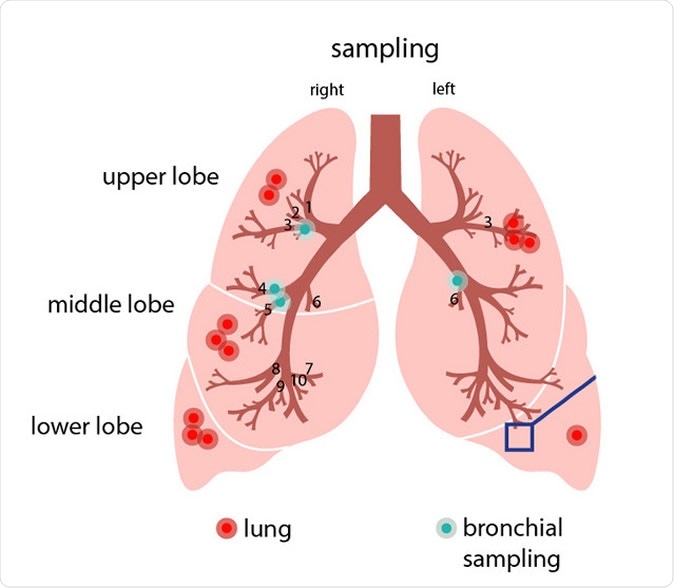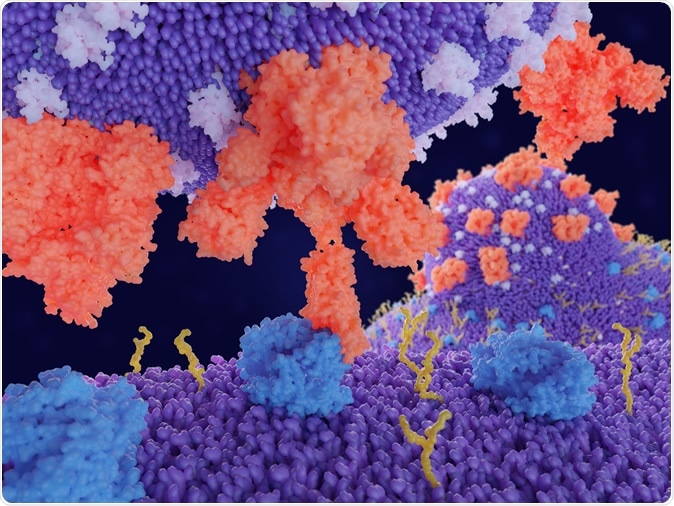Viruses attack specific host cells, which can cause chaos in the body. The novel coronavirus, now called severe acute respiratory syndrome coronavirus 2 or SARS-CoV-2 for short, infects respiratory epithelial cells in the lining of the lung, causing difficulty of breathing. The usual cause of death of those who contract the virus is pneumonia and acute respiratory distress syndrome (ARDS). Now, a new study has found that SARS-CoV-2 specifically attack certain progenitor cells called bronchial transient secretory cells in the lungs.
A team of researchers at the Berlin Institute of Health (BIH), Charité - Universitätsmedizin Berlin and the Thorax Clinic at Heidelberg University Hospital has identified the cells that SARS-CoV-2 attacks in the lungs, triggering a widespread inflammation in the respiratory tract. The team examined samples from non-virus infected patients to see what cells of the lungs and bronchi are targeted by the virus.

The team has found that the receptor for the coronavirus is abundantly expressed in progenitor cells, which develop into respiratory tract cells lined with cilia or hair-like projections that get rid of mucus and bacteria in the lungs. Published in The EMBO Journal, the study sheds light on how the virus affects the lungs and how pneumonia follows.

Binding of the coronavirus spike protein(red) to an ACE2 receptor (blue) on a human cell leads to the penetration of the virus in the cell, as depicted in the background. 3d rendering. Image Credit: PDB 3sci / Shutterstock
COVID-19 and the lungs
Initially, the team first intended to review why lung cancer happens in people who are non-smokers. They studied samples of 12 lung cancer patients from the Heidelberg Lung Biobank. The samples came from both the healthy part of the lung and the part with cancer. They also analyzed the cells from the airways of healthy patients for comparison.
In the advent of the coronavirus disease pandemic, the team wanted to take another look at existing but unpublished data.
"I was convinced that the data we gathered from these non-coronavirus infected patients would provide important information for understanding the viral infection," Roland Eils, founding director of the BIH Digital Health Center, said.
Receptors and cofactors
The team wanted to see which specific cells the coronavirus attacks. It was previously known that the coronavirus's spike protein attaches to an angiotensin-converting enzyme 2 receptors on the surface of the cell. Further, the virus needs one or more cofactors for it to enter the cells.
The team used single-cell sequencing technology to examine the cells in the samples from Heidelberg. They analyzed and sequenced 60,000 single cells to determine if they activated the gene for the receptor and potential cofactors.
"We then analyzed a total of nearly 60,000 cells to determine whether they activated the gene for the receptor and potential cofactors, thus in principle allowing them to be infected by the coronavirus," Soeren Lukassen, one of the lead authors of the study, said.
"We only found the gene transcripts for ACE2 and the cofactor TMPRSS2 in very few cells, and only in very small numbers," Lukassen said.
They also found that specific progenitor cells in the bronchi are responsible for producing the coronavirus receptors. The new discovery will help pave the way for developing targeted therapies. Also, the team found that the ACE2 receptor density on the cells heightened with age and was more abundant in men than in women, which explains why COVID-19 infected more men and women and targets older adults more.
The only limitation the study has is that there is a small sample size to generate conclusive statements. The team said that further study is needed and performed in larger patient cohorts.
"These results show us that the virus acts in a highly selective manner and that it is dependent on certain human cells to spread and replicate," Eils explains.
"The better we understand the interaction between the virus and its host, the better we will be able to develop effective counterstrategies," Prof. Eils said.
"We want to understand why the infection takes a benign course in some patients while causing severe disease in others. So, we will also look closely at the immune cells in the infected tissue," he added.
COVID-19 is spreading rapidly across the globe, and scientists are clamoring to develop therapies for the deadly infection. The virus has infected nearly 1.5 million and killed nearly 90,000 people worldwide.
Source:
Journal reference:
- Lukassen, S., Chua, R., Trefzer, T., Kahn, N., Schneider, M., Eils, R. et al. (2020). SARS‐CoV‐2 receptor ACE2 and TMPRSS2 are primarily expressed in bronchial transient secretory cells. The EMBO Journal. https://www.embopress.org/doi/10.15252/embj.20105114